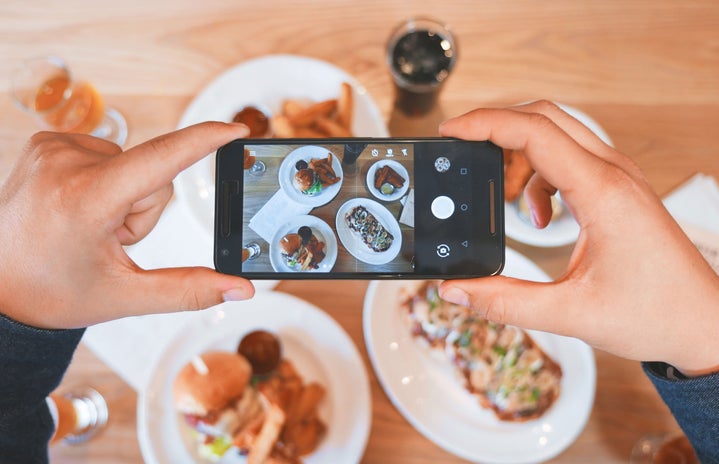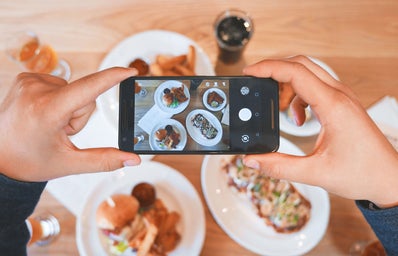Buried deep in my box of unused and half-filled decorative notebooks that I keep buying for no reason lies a hot pink diary that I used as a food tracker for a solid two days. Inside, I wrote something about pasta and the calories. It’s a memorial that commemorates my decade-long struggle to understand food.
See, my relationship with food has always been rocky. Growing up, I didn’t really pay attention to the things I ate. As a kid, you don’t really think about the sleeve of Ritz crackers you just scarfed down. Or how much sugar is in your Pacific Cooler Capri Sun. You don’t really care for serving sizes or calories. All you want is that Happy Meal (and the little, plastic, vaguely-french-fry-smelling trinket inspired by whatever movie was in theaters.)
For me, that changed when my family started pestering me about weight gain at the ripe age of 5. Every time someone helped me take a bath or when I put on my leotard for ballet, there would be some kind of commentary on my body. By the time I was 8, I made friends with the bathroom scale and became addicted to comparing my weight to my peers on the playground. So long as I wasn’t heavier than my peers, I was happy.
Then came the health unit in middle school. My health teacher would have us track our calorie intake and food through ChooseMyPlate. Sometimes we had to share what we ate that day in front of the class. Nothing made me more insecure than watching my calorie count go up and telling my classmates about the unhealthy decisions I made that week. Frankly, it was embarrassing.
Food remained a sensitive topic for me through puberty and high school, especially when I was having self-esteem issues. Unhappy with my weight and body, I’d skip meals and exercise sporadically. I’d use food diary apps to help me keep track of what I ate every day.
Let me tell you, I tried every app that was out there, from MyFitnessPal to Lifesum. But, I always encountered the same problems.
1. Had a hard time tracking the food I ate.
Coming from an Asian family that mostly eats Cantonese dishes, I could never really track the food I ate. Instead of having the luxury of just inputting “pasta” and having the app predict the calories for me, I would estimate how much I ate of every ingredient that went into my dish.
2. Seeing my calorie count constantly knocked down my self-esteem.
All the apps I encountered didn’t allow me to turn off calorie counting. Seeing calories add up made me insecure. It didn’t motivate me to eat healthier. It just stopped me from eating altogether.
The truth was, I never needed to count my calories. I was a healthy weight and I had a healthy body. My goal shouldn’t have been to lose weight. I should’ve focused on maintaining my health. The only thing I needed to change was my eating habits. Substitute my guilty-pleasure snacks for better options. Eat the right portions. Gain some self-confidence. Stuff like that. The only thing counting calories was doing for me was making me anxious. Food stressed me out.
I still wanted to use an app to track everything from food, exercise, and water consumption. I just didn’t want the calories. (Crying emoji.)
Then, one fateful day, I was blessed with Foodility.
What is Foodility?
Foodility is a simple food tracker application. You can:
- track exercise, weight, water intake, food, medication, supplements, and mood
- add notes about everything else you need
- set timers that remind you to take medication or drink water
- generates charts so that you can see your health progress overtime
Foodility functions like a notebook. Unlike most food tracker apps I’ve experimented with, where you search for and select types of food, drink, or exercise off a pre-curated menu, Foodility let’s you type in everything yourself. I no longer have to deal with the frustration of finding Cantonese dishes on a westernized app. Because Foodility offers everything on a basic and customizable level, the app is super flexible and allows users to utilize the app however is best for their health goals or lifestyles.
Best of all, Foodility doesn’t force you to track calories. Foodility is exactly what it says it is on the most fundamental level: a food and fitness diary.
Foodility allowed me to keep track of my food and exercise without glaring numbers dragging my self-esteem down. Freed from the guilt I always felt after eating even the smallest snack, I was able to built a new relationship with food.


